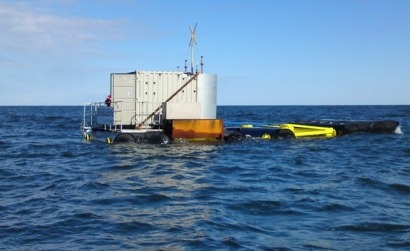
A scale model of Dexawave’s wave machine has been installed in the sea off the Maltese town of Marsascala and, together with measuring buoys off the neighbouring island of Gozo, is already providing an insight into wave conditions in the area.
The wave converter off the Maltese coast is a 1:10 scale model of a Dexawave wave converter previously tested in the Limfjorden when the first steps towards wave energy were taken in Denmark.
According to the company, this first stage of the project “will throw light on if the energy from the waves can be used as energy at Malta”. The Maltese government is supporting the data collection exercise through the Malta Council for Science and Technology.
The Times of Malta reported earlier this month that the Malta Council for Science and Technology had revealed that the wave energy research project off the coast of Gozo “is producing very encouraging results, sparking a lot of interest in Europe and hitting the international media”.
The converter is placed so close to the coast that it can serve as the demonstration project that MCST has asked Dexawave to establish. It produces electricity for its own consumption, and in principle, works just like the bigger machines and in the evening it can be seen from the coast, because it is lit by an LED light.
“The project at Malta is going to provide a basis for an economical calculation for the energy that can be produced in the Mediterranean by the Dexawave converter. The data is going to be matched with the data from the North Sea where a bigger converter for several months has been tested off coast Hanstholm,” explains Dexawave.
Because of the geographical position of Malta it is not possible to use energy from neighbouring countries, and currently Malta receives energy from local, traditional energy sources. However the Maltese government has worked out an ambitious plan for expanding renewable energy sources to 2020. This plan has prioritised exploring the possibilities for wave energy, as the islands have much more water than land to site renewable energy generating capacity.
The project is funded by the council and the Technology National Research and Innovation programme and coordinated by DexaWave Energy Malta in collaboration with Euromed Eco Power, the Institute for Sustainable Energy and the International Ocean Institute Malta Operation Centre at the University.
The test period of DexaWave’s device is expected to extend until the end of 2012.
For additional information:

